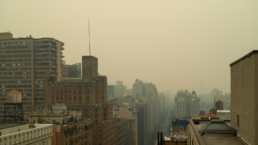The human costs of global warming — and of our response to it.
by Stan Cox, LA Progressive
Several times in recent weeks I’ve heard people suggest that Mother Nature has been speaking to us through that smoke endlessly drifting south from the still-raging Canadian wildfires. She’s saying that she wants the coal, oil, and gas left in the ground, but I fear her message will have little more influence on climate policy than her previous ones did. After all, we essentially hit the “snooze” button on the wakeup call from Hurricane Katrina 18 years ago; ditto the disastrous Hurricane Sandy seven years later, as well as the East Coast heat waves and West Coast wildfires of more recent years; or the startling overheating of global waters and the sea level rise that goes with it. And that’s just to begin an ever longer list of horrors.
Despite the fact that, in recent weeks, more than 100 million North Americans have been inhaling lungfuls of smoke from those Canadian wildfires, we’ll probably continue to ignore the pummeling so many here are enduring daily while carbon dioxide continues to accumulate overhead. Climate disasters are not only failing to goad governments into taking bold action but may be nudging societies toward increasing violence and cruelty.

Recently, Joel Millward-Hopkins of the University of Leeds suggested that, as the climate emergency intensifies, we may only find ourselves ever more affected by some of the indirect impacts of global warming. Those would include the “widening of socioeconomic inequalities (within and between countries), increases in migration (intra- and inter-nationally), and heightened risk of conflict (from violence and war through to hate speech and crime).” Such impacts, he suggests, will reflect a “highly inconvenient overlap with key drivers of the authoritarian populism that has proliferated in the 21st century.” Inconvenient indeed.
In other words, although weather disasters of many kinds can increase public concern about climate change, they can also help to whip up an oppressively violent sociopolitical climate that may prove ever more hostile to the very idea of reducing greenhouse-gas emissions — especially in large, affluent, high-emission societies.
Recent Posts
‘Unconstitutional. Unethical. Authoritarian.’ ICE Bars Millions Of Immigrants From Bond Hearings
July 18, 2025
Take Action Now One watchdog said the new policy “seems like a blatant attempt to stop them from exercising their right to due process.”……
Americans Are Not Nearly Alarmed Enough About Climate Change
July 18, 2025
Take Action Now Americans still don’t comprehend how imminent, dangerous, and far-reaching the threat is—and journalists are partly to blame.By…
The IRS Is Building A Vast System To Share Millions Of Taxpayers’ Data With ICE
July 17, 2025
Take Action Now ProPublica has obtained the blueprint for the Trump administration’s unprecedented plan to turn over IRS records to Homeland Security…
Israel’s Sudden Assault On Syria Is Unchecked Aggression
July 17, 2025
Take Action Now Jerusalem is bombing Damascus and threatening al-Sharaa’s rule, while Washington was hoping to help the nascent government on…




